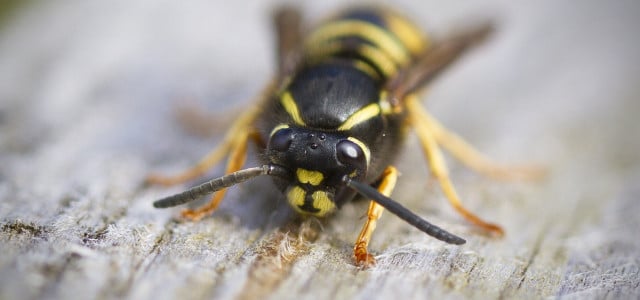
You can also treat wasp stings effectively with home remedies – we will show you which remedies will help the swelling go down faster and the itching subside.
If you’re having a picnic in the summer, it won’t be long before you’re plagued by intrusive wasps. One hectic movement and one of these pests has stung you. The wasp sting is extremely painful and the itching is annoying, but in most cases the sting is harmless.
Treating a wasp sting – what to do?
If you have been stung by a wasp, it is especially important to stay calm. You should observe how your body reacts to the wasp sting. If you experience shortness of breath, rapid heartbeat or circulatory problems immediately afterwards, you should definitely seek medical advice or call an ambulance straight away.
If this is not the case, you can also treat the sting yourself. You don’t always have to resort to preparations and ointments from the pharmacy – there are also very effective home remedies for the swelling or annoying itching that occurs.
By the way: There are simple tips to gently drive away wasps.
Treating wasp stings: 9 effective home remedies

(Photo: CC0 Public Domain / Pixabay / cornelinux / )
-
Cooling: The most important thing is to cool the wasp sting. Ice packs are ideal for this, and are easy to have on hand when picnicking in the countryside or at the outdoor pool, as are ice cubes. The cold reduces itching and inhibits inflammation. It also reduces swelling. Important: Always wrap cooling pads or packs in a cloth to avoid frostbite!
-
Heat: When exposed to localized heat, the proteins in wasp venom break down. Heating metal – such as a spoon – or taking a cotton ball soaked in hot water and gently pressing it onto the wound can also soothe the wasp sting.
-
Onion: A tried and tested home remedy is freshly cut onions – you can use them to treat an acute wasp sting. Putting half an onion on the sting for about half an hour works wonders. The onion juice has antibacterial properties, disinfects and relieves itching. The swelling also goes down.
-
Honey: Just like onions, honey has an antibacterial effect and has proven to be a useful home remedy, not only for treating wasp stings.
-
Ribwort plantain leaves: They are an ideal first aid measure if you are stung in the wild. They grow practically everywhere and all you need to do is rub them between your fingers and dab the juice onto the wasp sting. Pain and swelling subside almost immediately. You can also make your own ointment from ribwort plantain for your first aid kit.
-
Essential oils: They not only help keep annoying insects away, but you can also use them to treat insect bites. Tea tree oil, for example, helps reduce swelling. Clove, eucalyptus or lavender oil reduce itching, and peppermint oil has a pleasantly cooling and disinfecting effect.
-
Baking soda: If you dilute baking soda with a little water, it helps to neutralize the wasp’s acidic venom. To do this, dip a cotton ball in the solution and fix it to the affected area with a bandage.
-
Vinegar: Compresses with vinegar water have a cooling and disinfecting effect on wasp stings.
-
Aloe Vera: It not only moisturizes the skin, but also reduces itching. Simply cut off a leaf and spread the gel on the bite. Don’t have any aloe vera at home? Then you can plant it easily and simply.
Read more on Techzle\.com:
- Bee deaths – what can I do about it?
- Fighting ants: natural home remedies for garden and home
- Removing a wasp nest: Why relocation is the better alternative
Edited by Lena Kirchner
** marked with ** or orange underlined Links to sources are partly affiliate links: If you buy here, you are actively supporting Techzle\.com, because we then receive a small part of the sales proceeds. .
You might also be interested in these articles
-
Planting native wild perennials in the garden: How to do it
-
Sustainable gardening: 6 tips for garden care and weed prevention without chemicals
-
Quiz: Can you name all 9 butterflies?
-
Lavender: Planting and caring for it – the best tips
-
8 wild herbs you can collect now in autumn
-
Phacelia: How to plant bee friend and what you need to know
-
9 tips for more species protection & an insect-friendly garden
-
Forgotten medicinal herb: Planting, caring for and using black nettle
-
Biodiversity in agriculture – These measures help biodiversity